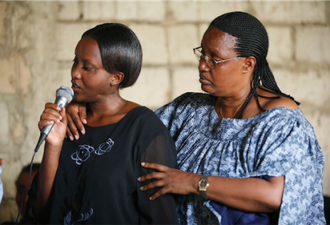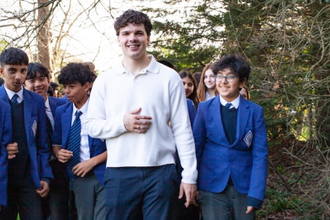Obituary: Mama Lambert - Christianity in action

Mama Lambert comforts young genocide orphan
Some people are natural leaders, while others have the ability to put distressed and vulnerable people at ease, offering them comfort and compassion. However, it is rare to find someone who combines both characteristics. With the death of Mama Lambert last week, Rwanda has lost such a unique person.
Until 1994, Beata Mukarubuga was a teacher in Rwanda, living with her husband and their eight children. Everything changed on one brutal day when the genocidal Hutu Power militia arrived in Beata's neighbourhood in the southern province of the country, hunting her ethnic group. They slaughtered five of her children as well as her husband and all her siblings.
In common with hundreds of thousands of Tutsi, she fled with her surviving children, including one-year-old Lambert. They hid in the bush for three months, hunted by dogs and soaked during the rainy season. She dropped the name Beata (which means blessing) and called herself Mama Lambert, after the remarkable survival of her little boy. She moved to the capital, Kigali, since her home had been destroyed by the mob, leaving her with nothing.
In 1995, she heard about a new non-governmental group called Solace Ministries, started by a former hospital administrator called Jean Gakwandi. Jean had recognised the desperate need for genocide widows and orphans to find a safe space where they could mourn together, find consolation in their Christian faith and solidarity in mutual support. Solace Ministries held services of worship where people who had previously felt isolated and afraid could enjoy fellowship.
Part of the survivors' journey was finding the courage to talk about their experiences during the violence. For Westerners who live in a confessional age when people reveal their private traumas in the media, it may seem strange that Rwanda's survivors often kept their horrific experiences to themselves for years and even decades. Few Rwandans revealed their past suffering, let alone came to terms with it.
Mama Lambert was to become an essential part of Solace's healing ministry. Although she began as one of many hundreds of widows being comforted by attending Solace, she was soon giving comfort to others. By 2002, she was a member of the Solace staff, helping the thousands of widows and orphans who relied on Solace for spiritual support, as well as practical aid such as clothing and medical help. She travelled across Rwanda, supporting the growing Solace presence (now in 60 communities).
I witnessed Mama Lambert's effect on traumatised and vulnerable survivors many times, attending testimony meetings where she emotionally and physically supported people as they shared their experience during the 1994 genocide. Her preaching was pure and simple, and she commanded the attention, respect and love of the hundreds of people attending meetings where she presided.
Yet, her own journey was distressing. The Rwandan government did not have the resources to put on trial every person who had killed during the genocide. They adapted a traditional form of truth commission called gacaga, where people who participated in the genocide confessed before a community meeting what they had done in the one hundred days of killing in 1994. When Mama Lambert attended the trial of the man who admitted to slaughtering her family, he mocked her by refusing to tell her where he had buried their bodies. His one remaining form of power was to deny her the ability to get closure. No wonder Rwandans are bewildered when Westerners expect them to have "gotten over" the genocide.
When I was writing this obituary, I spoke to several genocide orphans who recounted how important Mama Lambert had been in their lives, helping them as they navigated challenges, without family or resources, that most of us will never face. She was deeply loved by literally thousands of people for whom she was a rock of faith, support and hope. Shoe would have been 72 in December.
To donate to the work of Solace Ministries click HERE


















